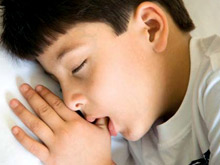Health Topics
-
Healthy Living
-
|
|
December 2009
|
| 6 Winter Worries with Children |
| Dr Anupam Sibal & Dr Nishant Wadhwa |
| |
 |
Although all seasons have their fair share of good and bad, winter stands tall in reminding us of the lists of health conditions we could fall prey to, if we're not cautious enough. The all-time low, though, is when little children are subjected to these diseases. |
They most often find it difficult to explain their problems clearly. And we worry sick trying to nurse their cranky complaints and bad moods. So why not modify this winter in your house? Kick out the tantrums and worry, and spend the winter with a warm cup of cocoa and a board game with family.
The solution is to understand what winter diseases your children are most likely to be prone to. Watch out for - viral respiratory infections, sore throat (pharyngitis), ear infections and viral gastroenteritis. Here are some of the common winter worries we hear from concerned parents, with resolutions you can make for them.
|
What should be done should my child have a respiratory infection?
The usual cold simply has to be allowed to run its normal course. A cool mist humidifies and helps retrieve stuffy nose. Older children may gargle with salt water.
- Limit exposure to others: Cover the mouth with tissue while coughing and sneezing and throw the used tissue in trash immediately.
- Fluids can help loosen mucus and make the child feel better. Give plenty of fluids and juices to the child. Avoid caffeinated products, as they cause dehydration.
- Paracetamol is the preferred medication for fever.
- Keep child warm and covered up, to protect from the chill.
- Nasal decongestants help unclog stuffy nose.
- Antihistaminics help stop runny nose.
- Consult your pediatrician.
What should I do if my child has asthma? Should I take any special precautions?
Besides the usual precautions as described earlier, children with asthma should continue to take their medicines, if they are on regular medication. They should avoid exposure to the chill, smoke and dust. Some children may need to start some medicines during the early season change. Those children, who have increase in their symptoms, should contact their doctor immediately.
Are antibiotics required in all case of respiratory infections?
No, antibiotics are useful only against bacterial infections. While antibiotics may be useful in select cases, most respiratory infections in children are viral in nature, hence do not require them. Let your pediatrician decide the need and type of antibiotic to be used.
What if my child complains of ear pain?
It is not unusual for a child who has a cold to subsequently develop ear pain. A smaller child may also tug at his/her ear or be out-of-sorts. Sucking and swallowing can also hurt. Most of such infections only require symptomatic treatment with painkillers. It is important to get the child examined by a pediatrician, who would then decide on the need for antibiotics.
|
3 Tips to Keep Diseases at Bay
Hand washing: Most infections are transmitted through coughing, sneezing and contaminated surfaces, including hands. Hand washing with soap and water is effective in interrupting this transmission.
Limit exposure: Infants and children should be kept away from crowded places. This is especially important for premature babies who may have underlying lung/heart disease.
Balanced diet: A diet rich in vitamins and micro nutrients besides proteins, carbohydrates and fats helps build a robust immune response which protects the child against infections. |
When to see a doctor?
Certain symptoms in children warrant urgent medical consult. These are persistently high fevers, cough that disturbs sleep, abnormal behaviour such as unusual drowsiness, refusal to eat, crying a lot, holding ears and stomach and wheezing. It is important to remember that while seasonal illness can be stressful for parents, most of these are mild and resolve spontaneously. Parents and children should make the best of their time together, even in sickness. This can be used as opportunities to be together, and do various activities like reading, listening to music etc. Love and attention are powerful medicines. Sick days well spent can result in lasting memories for both children and parents.
What if my child has a respiratory infection and develops diarrhea subsequently?
Many virus which cause upper respiratory tract infections in children may also result in loose stools in a few days after onset of respiratory symptoms. Most such cases can be managed by giving WHO-ORS solution to prevent dehydration. It's important to continue feeding the child during diarrhea. Zinc supplements should be started and continued for two weeks after relief of symptoms. Consult your pediatrician if diarrhea persists for more than seven days. |
|
|
 |
Dr. Anupam Sibal is Group Medical Director, Apollo Hospitals Group, & Senior Consultant, Pediatric Gastroenterologist and Hepatologist at Apollo Centre for Advanced Pediatrics, New Delhi
Dr. Nishant Wadhwa is Pediatric Gastroenterologist and Hepatologist at Apollo Centre for Advanced Pediatrics, Indraprastha Apollo Hospital, New Delhi |
|
|